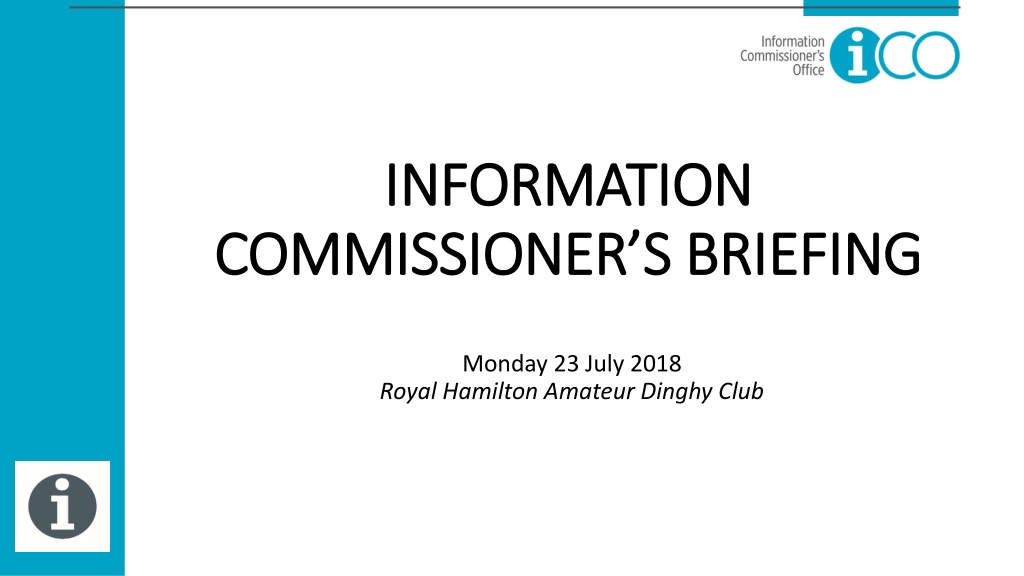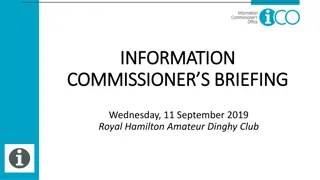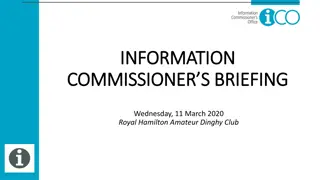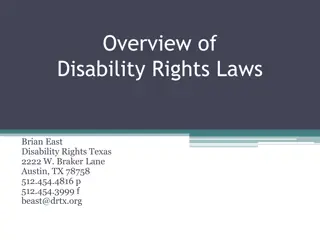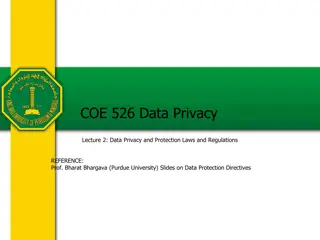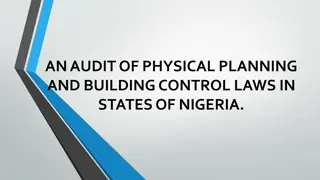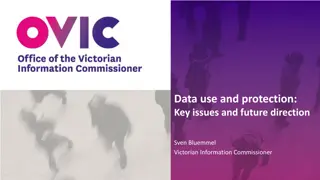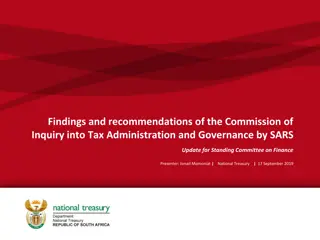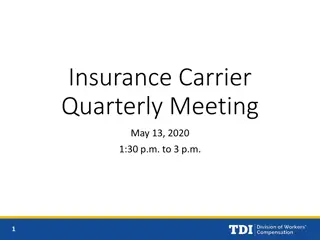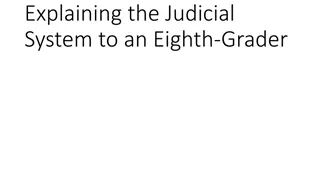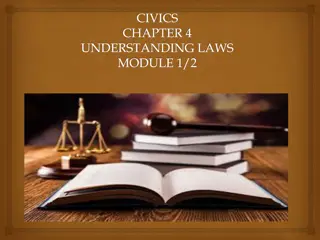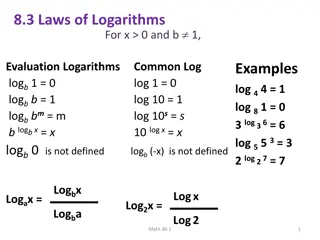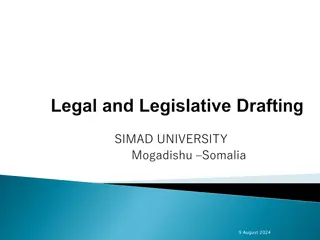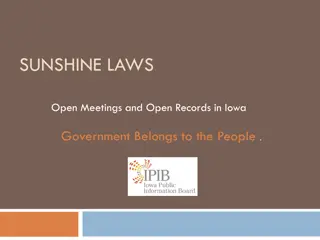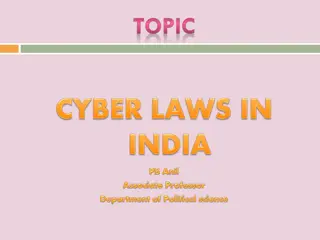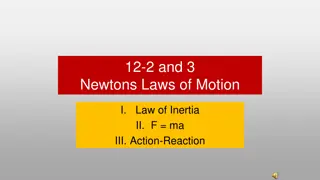Understanding the Role of Information Commissioner in Access to Information Laws
Explore the role and responsibilities of the Information Commissioner in promoting awareness of rights, providing guidance, overseeing reviews, and issuing legally binding decisions. Learn about PATI standards, tests, and the importance for public authorities to comply with regulations. Discover where these standards are found and how decisions are upheld, drawing from relevant laws and best practices.
Download Presentation

Please find below an Image/Link to download the presentation.
The content on the website is provided AS IS for your information and personal use only. It may not be sold, licensed, or shared on other websites without obtaining consent from the author. Download presentation by click this link. If you encounter any issues during the download, it is possible that the publisher has removed the file from their server.
E N D
Presentation Transcript
INFORMATION INFORMATION COMMISSIONER S BRIEFING COMMISSIONER S BRIEFING Monday 23 July 2018 Royal Hamilton Amateur Dinghy Club
AGENDA AGENDA 9:00 9:20 Introductions to ICO and Information Commissioner s Decisions Standards for Duty to Assist the Requester Break Standards for Conducting a Reasonable Search Wrap-up and Evaluations 9:20 10:15 10:15 10:30 10:30 11:15 11:15 11:30
Information Commissioners Mandate Information Commissioner s Mandate Promote awareness of the rights Provide guidance and oversight Conduct reviews and issue legally binding decisions
Role of the Information Commissioner Role of the Information Commissioner Decisions During PATI Request Process PATI Judicial Review & Decision Internal Review Decision Information Commissioner s Review & Decision Request & Initial Response Information Commissioner Information Officer Head of Authority Judge
PATI Standards and Tests How does a public authority know what the standard is?
Where the PATI standards and tests are found: PATI Act & Regulations & Practice Codes Information Commissioner Decisions (& ICO Guidances) Court decisions
Information Commissioner Decisions (& ICO Guidances) Uphold standards and tests, drawing from: PATI Act and Regulations and Practice Codes Other local law International best practices for access to information laws
Important for public authorities to: Important for public authorities to: Understand the requirements the PATI Act places on your public authority Know how to document your compliance
Information Commissioners Briefings Information Commissioner s Briefings Discuss WHAT the standards are in recent decisions and lessons from resolutions Responsibility of public authority to determine HOW it wants to meet these standards
Duty to Assist and Conduct a Reasonable Search Duty to Assist and Conduct a Reasonable Search Applicable to every public authority Involve fundamental obligations May determine whether PATI request is processed efficiently and effectively
Duty to Assist the Requester Duty to Assist the Requester Duty is a key idea for the cultural shift Starting with YES
Duty to Assist the Requester Duty to Assist the Requester Standard for duty to assist requirement Requirement set out in section 12(2)(a) public authorities must make every reasonable effort to assist persons in connection with request Test set out in 04/2018 Board of Immigration Fundamental duty that supports the right to access public information
Duty to Assist the Requester Duty to Assist the Requester Why is duty placed on public authority? Best placed to know what records it has Addresses the knowledge imbalance between member of the public and the public authority
Duty to Assist the Requester Duty to Assist the Requester Standard for duty to assist - test Public authorities shall make every reasonable effort to assist persons in connection with requests. 1. Make every reasonable effort 2. In connection with requests
Duty to Assist the Requester Duty to Assist the Requester 1. Every reasonable effort every efforts must be thorough and comprehensive effort that a fair and rational person would expect to be made under all the circumstances
Duty to Assist the Requester Duty to Assist the Requester 1. Every reasonable effort, cont. Examples of circumstances the Information Commissioner may consider include: nature of the request public authority s size and resources prior communications between individual and public authority
Duty to Assist the Requester Duty to Assist the Requester 1. Every reasonable effort- cont. Reasonableness of the efforts viewed in light of purposes of in section 2 of the PATI Act: to give public the right to access public information to greatest extent possible within provisions of PATI Act
Duty to Assist the Requester Duty to Assist the Requester 1. Every reasonable effort- cont. Purposes, cont.: to increase transparency and eliminate unnecessary secrecy to increase accountability of public authorities to inform the public about public authorities activities and decision making
Duty to Assist the Requester Duty to Assist the Requester 2. In connection with requests duty to assist extends to people who are considering filing a PATI request and have questions about the public authority or its records
Duty to Assist the Requester Duty to Assist the Requester 2. In connection with requests cont. Continues throughout PATI process, and may include: helping requester understand the public authority s records and processes reaching out to requester while processing the request
Duty to Assist the Requester Duty to Assist the Requester Key to handling a request effectively & efficiently Good service to the public Fundamental duty (if not met, may lead to other problems with compliance) Helps to ensure that other PATI requirements are met
Provide a complete and accurate response Duty to Assist Offer to assist requester before administrative denial Conduct a reasonable search
BREAK BREAK
Duty to conduct a reasonable search Duty to conduct a reasonable search Requirement set out in section 12(2)(b) and Regulation 5 Test set out in Decision 04/2017 Department of Health and 02/2018 Department of Human Resources Several cases that were resolved involved whether the public authority s search was adequate
Duty to conduct a reasonable search Duty to conduct a reasonable search To determine if search was reasonable, the Information Commissioner will consider: 1. The quality of the public authority s analysis of the request, 2. The scope of the search that it decided to make on the basis of that analysis, and 3. The rigour and efficiency with which the search was conducted.
Duty to conduct a reasonable search Duty to conduct a reasonable search 1. The quality of the public authority s analysis of the request. Examples of factors that may be considered: Was the public authority s understanding of the request accurate, complete and adequate? Was the request read too narrowly?
Duty to conduct a reasonable search Duty to conduct a reasonable search 2. The scope of the search that the public authority decided to make on the basis of that analysis Examples of factors that may be considered: What locations were identified for searching and why was it reasonable to think records would be here? Who are the individuals likely to hold responsive records? Were electronic files and emails included?
Duty to conduct a reasonable search Duty to conduct a reasonable search 3. Rigor and efficiency with which the search was conducted Examples of factors that may be considered: Was the individual who searched familiar with the records? Was access given to search all relevant record locations? If not, why?
Duty to conduct a reasonable search Duty to conduct a reasonable search 3. Rigor and efficiency with which the search was conducted, cont. Were the steps taken reasonable and adequate? Did the searcher try once, or send chaser emails? Did only 50% of the relevant staff respond to the email for records? Did the director provide full access to their records?
Duty to conduct a reasonable search Duty to conduct a reasonable search 3. Rigor and efficiency with which the search was conducted, cont. Was the search begun early enough to allow for adequate steps? Did the public authority communicate with the requester, as appropriate, if difficulties arose with the search?
Duty to conduct a reasonable search Duty to conduct a reasonable search PATI Regulation 5 search log Required to document search steps in a search log: note details of steps taken keep screen shots of electronic searches keep copies of internal emails asking for records keep track of time spent note communications with requester and others
Duty to conduct a reasonable search Duty to conduct a reasonable search Circumstances of the case Specific circumstances of the case will inform the Information Commissioner s assessment, and may include: evidence of discussions with requester to clarify request public authority s records management practices details of any search plan other reasons offered by the public authority to justify the reasonableness of its search
Duty to conduct a reasonable search Duty to conduct a reasonable search Burden on public authority Public authority bears the burden of demonstrating that on the balance of probabilities, its search was reasonable.
Wrap Wrap- -up up Learn more about Information Commissioner s decisions: Decisions published on www.ico.bm Monthly Roundups highlight learning lessons ICO Guidances published on www.ico.bm General questions for ICO at 294-9181 or info@ico.bm
INFORMATION INFORMATION COMMISSIONER S BRIEFINGS COMMISSIONER S BRIEFINGS 2018-2019 Schedule Friday, 14 September 2018 Wednesday, 5 December 2018 Thursday, 14 March 2019
